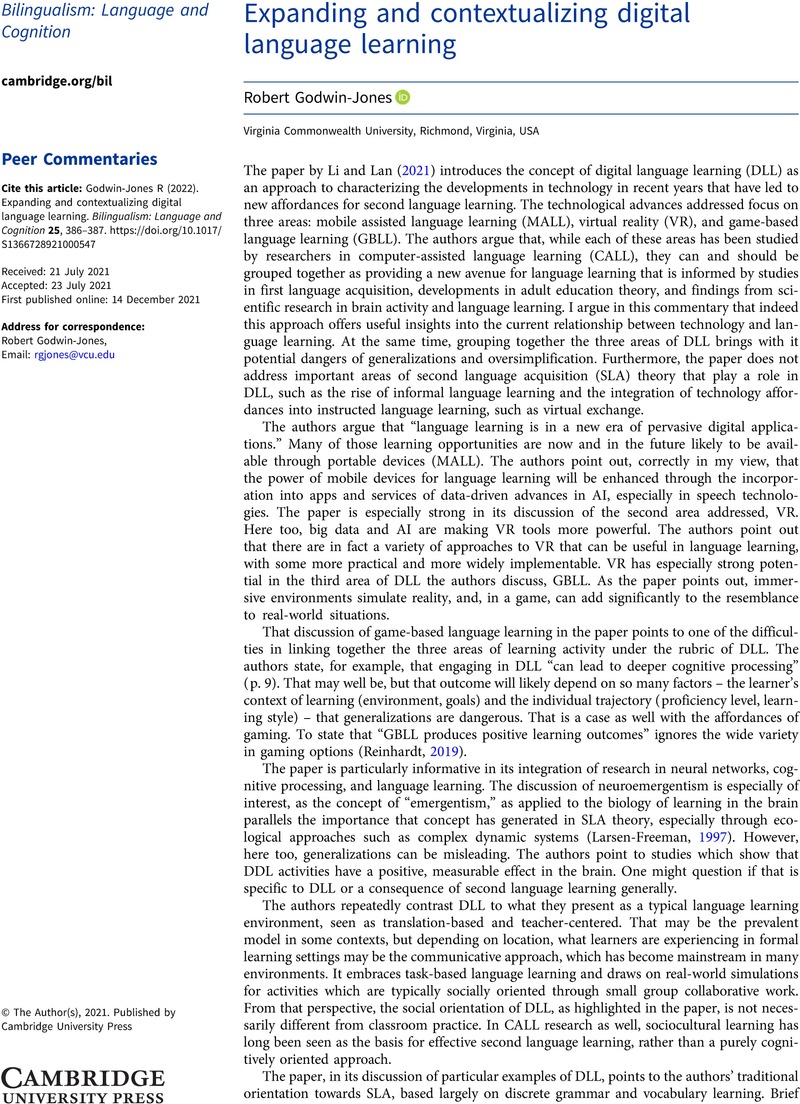Crossref Citations
This article has been cited by the following publications. This list is generated based on data provided by Crossref.
Li, Ping
and
Lan, Yu-Ju
2022.
Understanding the Interaction between Technology and the Learner: The Case of DLL.
Bilingualism: Language and Cognition,
Vol. 25,
Issue. 3,
p.
402.
Peña-Acuña, Beatriz
2023.
Trending Topics about Performance in Second Language Learning .
East European Journal of Psycholinguistics ,
Dooly, Melinda
and
López Vera, Mónica
2024.
La realidad virtual (RV) en el aula de la lengua inglesa: un estudio etnográfico.
Didáctica. Lengua y Literatura,
Vol. 36,
Issue. ,
p.
201.
Zhao, Ruibin
Zhuang, Yipeng
Xie, ZhiWei
and
Yu, Philip L.H.
2024.
Facilitating self-directed language learning in real-life scene description tasks with automated evaluation.
Computers & Education,
Vol. 219,
Issue. ,
p.
105106.
Ngo, Nguyen Thien Duyen
and
Pham, Huong Ngoc Uyen
2024.
Exploring the Influence of Social Media and Online Communities on Affordances in ELT.
International Journal of Language Instruction,
Vol. 3,
Issue. 4,
p.
119.
Topal, Ibrahim Halil
2024.
Tandem language exchange application: A telecollaborative experience of linguistic and cultural exchange.
Journal of Digital Educational Technology,
Vol. 4,
Issue. 1,
p.
ep2408.
А.А., Андреева
and
А.А., Шакарикова
2024.
Внедрение искусственного интеллекта в образовательный процесс: опыт и перспективы
.
Bulletin of Pedagogical Sciences,
p.
105.
Chen, Ching-Huei
and
Yeh, Hui-Chin
2025.
Advancing English for specific purposes (ESP) pedagogy in engineering education: infusing generative learning strategies into AR game design for enhanced vocabulary acquisition and critical thinking.
Computer Assisted Language Learning,
p.
1.
Vinčela, Zigrīda
and
Kuzmina, Jana
2025.
Language Technology Initiative: digital competence enhancement case study.
Baltic Journal of English Language, Literature and Culture,
Vol. 15,
Issue. ,
p.
51.
Noori, Abdullah
2025.
Digital Technologies and Self-Regulated Language Learning: A Systematic Review .
Journal of Social Sciences - Kabul University,
Vol. 8,
Issue. 1,
p.
243.
Luu, Dang Kim Cuc
and
Bui, Diem Bich Huyen
2025.
The Utilization of Chat-GPT 3.5 for Vocabulary Learning: A Study on Students’ Perceptions.
AsiaCALL Online Journal,
Vol. 16,
Issue. 1,
p.
226.
YELUBAYEVA, PERIZAT
FLENNIKEN, LAUREN
OWEN, TODD
and
GABDULLINA, ZHANARGUL
2025.
EMPOWERING INCLUSIVE KNOWLEDGE SOCIETIES: INTEGRATING MEDIA LITERACY IN UNIVERSITY-LEVEL LANGUAGE EDUCATION IN THE USA AND KAZAKHSTAN.
Journal of Central Asian Studies,
Vol. 23,
Issue. 1,
Puspitaningsih, Indah
Maula Jasmine, Shyifa
Fuadiyah, Fia
Suhartono, Anugrah
Chelsea Kimberly, Abigael
and
Rosalina, Utami
2025.
Tracing The Shifting Goals and Curriculum Trends in English Language Teaching (2015-2025): A Systematic Literature Review and Bibliometric Analysis.
Sinergi International Journal of Education,
Vol. 3,
Issue. 3,
p.
186.
Dziubata, Zoriana
2025.
Teaching Digital ESL Communication Skills for Remote Work Environments.
Педагогічний дискурс,
p.
131.
Nuesser, Michaela
Zheng, Dongping
and
Dong, Jin
2025.
Optimizing affordances of high immersive virtual reality for language learning.
Journal of China Computer-Assisted Language Learning,
Vol. 5,
Issue. 1,
p.
113.


